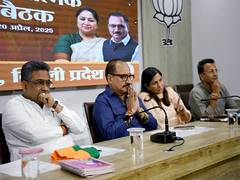Right to choose partner does not necessarily imply right to marry over & above procedure established by law: Centre to SC
New Delhi, May 3 (PTI) The right to choose a partner does not necessarily imply the right to marry such a person over and above the procedure established by law, the Centre Wednesday told the Supreme Court while urging it to dismiss the petitions seeking legal validation for same-sex marriage.
In his written submissions, Solicitor General Tushar Mehta, appearing for the Centre, said there cannot be a presumption that the State is obliged to recognise all human relationships, rather the presumption has to be that State has no business to recognise any personal relationships, unless it has a legitimate state interest in regulating the same.
A five-judge constitution bench headed by Chief Justice D Y Chandrachud is hearing arguments on a batch of pleas seeking legal sanction for same-sex marriage.
Mehta said in his written submissions that any non-inclusion would not per se become unconstitutional and even more so if the State can establish a clear and discernible policy premised on an intelligible differentia with a rational object.
“Therefore, it is submitted that the right to choose a ‘partner’ does not necessarily imply the right to ‘marry’ such person over and above the procedure established by law. It is submitted that marriage is a legal privilege conditional upon statutory or societal conditions,” he said.
The top law officer said, over and above marriage, there are a whole host of human relationships which exist in society, which may in some cases be even more valuable than marriage.
He said the statutory law, in any country in the world, does not regulate all human relationships and legislatures across the world have left a whole host of human relationships completely outside the legislative purview, denying any legal recognition to the same.
“It is submitted that the presumption, therefore, cannot be that the State is obliged to recognise all human relationships, rather, the presumption has to be that the State has no business to recognise any personal relationships, unless the State has a legitimate state interest in regulating the same,” Mehta said.
“If the said premise is accepted with regard to a complete freedom from State interference in personal relationships, it is crystal clear that non-inclusion in any legally recognised socio legal institution would not per se attract the wrath of the Fundamental Rights chapter of the Constitution,” he said.
In his written submissions, the top law officer said, hypothetically, it would be possible for a new religion to provide for a new form of marriage and new ceremonies for the same, within the heterosexual fold.
“Till the time any legislation covers it, it cannot be said that such persons can seek a legislative mandamus from the court to compel the Parliament to recognise such a newly formed religious union of marriage by whatever name called,” he said.
“It is submitted that numerous human experiments have been made and continue to be made in this regard, however, the State, in its legislative wisdom, may choose to recognise only such relationships that it deems worthy of attracting a legitimate State interest,” Mehta said.
He said there is no positive obligation for the State to regulate or recognise all forms of social relationships which may be dynamic in nature and also in some cases be legislatively impossible to recognise or regulate.
Mehta termed as “unfounded” the submissions of the petitioners that there exists a “fundamental right to marriage” under Article 21 (protection of life and personal liberty) of the Constitution by placing reliance on two previous verdicts of the apex court.
He said both these judgments were on the question of the “choice” of a couple in a heterosexual relationship, permitted by law of Parliament.
The solicitor general said there cannot be a fundamental right, either under Article 14 (equality before law) or 15 (prohibition of discrimination on grounds of religion, race, caste, sex or place of birth), to seek recognition to all forms of social relationships.
“It may be noted that the Legislature does not seek to give recognition or any special status to all forms of human relationships,” he said, adding, “Further, as far as the element of expression within the sexuality of a person is concerned, it is not impinged upon by denying same sex relationships the honorific status of marriage”.
During the hearing, the Centre told the apex court it will constitute a committee headed by the cabinet secretary to examine administrative steps that could be taken for addressing “genuine humane concerns” of same-sex couples without going into the issue of legalising their marriage.
The Centre’s submission came pursuant to the apex court asking it on April 27 whether social welfare benefits like opening joint bank accounts, nominating life partner in provident funds, gratuity and pension schemes can be granted to same-sex couples without going into the issue of legal sanction to their marriage.
The hearing in the matter would continue on May 9.






